Advancing Environmental Health Equity Through Implementation Science
Virtual Event

Paloma Beamer

Panelist
Paloma I. Beamer, Ph.D., is a professor in the College of Public Health at the University of Arizona. She holds joint appointments as a professor of Chemical & Environmental Engineering, American Indian Studies, Arid Lands, Bio5 Institute, and as a research scientist in the Asthma and Airway Disease Research Center. She is the Community Engagement Core Director for the Southwest Environmental Health Sciences Center (NIEHS P30). An environmental engineer by training, she earned her BS from the University of California Berkeley and her MS and Ph.D. from Stanford University. Her research focuses on understanding how individuals are exposed to environmental contaminants and the health risks of these exposures with a special focus on vulnerable populations, including children, low-wage immigrant workers, Native Americans, and those in the US-Mexico Border Region. The goal of her work is to develop more effective interventions and policies for prevention of certain diseases like asthma. Beamer is an Associate Editor for Environmental Health Perspectives and the Past President of the International Society of Exposure Science. She has served on the Boards of Scientific Counselors for United States Environmental Protection Agency (EPA) and Agency for Toxic Substances and Disease Registry (ATSDR).
Rinad Beidas

Keynote Speaker
Rinad Beidas, Ph.D., is the Director of the Penn Medicine Nudge Unit; Founder and Director of the Penn Implementation Science Center at the Leonard Davis Institute (PISCE@LDI); and Associate Director at the Center for Health Incentives and Behavioral Economics (CHIBE). She is an Associate Professor of Psychiatry; Medical Ethics and Health Policy; and Medicine at the Perelman School of Medicine at the University of Pennsylvania. Her research program is designed to improve the quality of health and mental health services through implementation science. To conduct this work, she collaborates closely with key stakeholders, including patients, clinicians, health system leaders, payers, and policymakers, to develop natural laboratories in which to answer questions of interest. Broadly, her work entails three primary foci that draw upon the methods of implementation science: (a) understanding the context in which individuals will implement EBPs, (b) developing implementation approaches that target the factors that may accelerate or hinder implementation, and (c) conducting pragmatic trials to test these implementation approaches. She does this work across disease areas (e.g., mental health, cancer, HIV). She has been identified as a leading implementation scientist and has published approximately 200 articles in this area. She serves as MPI on 2 NIH Centers on behavioral economics and implementation science (P50 MH 113840, P50 CA 244690) and has a strong record of NIH-funded implementation research serving as MPI or PI of 10 NIH grants totaling approximately $30 million dollars. She is deeply committed to training the next generation of implementation scientists and mentors graduate students, postdoctoral fellows, and junior faculty through a variety of mechanisms including a T32 at the intersection of implementation science and mental health. Beidas holds a Bachelor of Arts in psychology from Colgate University and a Doctor of Philosophy in psychology from Temple University. She is the recipient of several awards, including the Association for Behavioral and Cognitive Therapies President’s New Researcher Award in 2015; the American Psychological Foundation Diane J. Willis Early Career Award; and the Perelman School of Medicine Marjorie Bowman New Investigator Research Award in 2017.
Nanette Benbow

Panelist
Nanette Benbow, MAS, is a Research Assistant Professor in the Department of Psychiatry and Behavioral Sciences at the Northwestern University Feinberg School of Medicine and co-Director of the Third Coast Center for AIDS Research’s Behavioral, Social, and Implementation Science Core. She was formerly Director of the Chicago Department of Public Health’s (CDPH) - STI/HIV Surveillance, Epidemiology and Research Section and Deputy Commissioner of the CDPH STI/HIV Services Bureau. Her work at Northwestern focuses on using implementation science methods and frameworks to support implementation and dissemination of HIV evidence-based prevention and care interventions in public health department and HIV service organization settings. She is co-Investigator of an NIH-funded cluster randomized trial of an eHealth HIV prevention intervention, and co-PI of an NIH administrative supplement “Implementation Science Coordination, Consultation, and Collaboration Initiative (ISC3I)” which provides support to the science-practice partnerships funded through competitive CFAR/ARC supplements to use implementation science to end the HIV epidemic.
Aruni Bhatnagar

Panelist
Aruni Bhatnagar, Ph.D., is Professor of Medicine and Distinguished University Scholar at the University of Louisville (UofL). He is the Director of the Christina Lee Brown Envirome Institute and co-Director of the American Heart Association Tobacco Regulation Center. He is a leading expert on the mechanisms by which environmental exposures such as air pollution affect cardiovascular disease risk. At UofL, Bhatnagar’s work led to elucidation of the mechanisms by which free radicals and lipid peroxidation products affect the function of individual ion channels. He was the leader of a Program Project Grant from the NIEHS to study the cardiovascular toxicity of environmental aldehydes. In this program-project he directed a large multi-disciplinary team of investigators studying the molecular and cellular mechanisms of aldehyde toxicity. His studies at UofL have led to the development of the new field of Environmental Cardiology. He was the Deputy Editor of Circulation Research for 10 years. He has participated in over 50 NIH review panels and chaired several review panels. He was the recipient of the President’s Award for Outstanding Scholarship, Research and Creative Activity, University of Louisville, and Partner in Healthcare Award – Contributing to Greater Louisville Healthcare Community, in 2007. In 2007, he also received the first Outstanding Faculty Mentor of Graduate Students, and the Outstanding Mentor Award from the Conference of Southern Graduate Schools. In 2017, he was designated Research Exemplar by Washington University. Bhatnagar has published 381 peer-reviewed manuscripts, 25 book chapters and reviews and over 200 abstracts. He has mentored 61 graduate students and post-doctoral fellows in his laboratory and has served on the dissertation committee of 18 Ph.D. students.
Dara Blachman-Demner

Panel Moderator & Workshop Co-Chair
Dara Blachman-Demner, Ph.D., is a health scientist administrator in the Office of Behavioral and Social Sciences Research (OBSSR) at the NIH. In that role, she is primarily focused on efforts to facilitate the adoption of behavioral and social science findings into health research and practice. A licensed psychologist, Blachman-Demner received her B.A. from Duke University and her Ph.D. in clinical/community psychology from the University of California, Berkeley. She completed her clinical internship at the Institute for Juvenile Research at the University of Illinois, Chicago, and a postdoctoral fellowship at the Family Institute/School of Education and Social Policy at Northwestern University. Prior to joining OBSSR in January 2017, she served as a social science analyst at the National Institute of Justice (NIJ) for 6 years, where she initiated and oversaw portfolios related to the impact of youth violence and victimization experiences on health outcomes. Prior to NIJ, Blachman-Demner served as the coordinator of the Federal Interagency Forum on Child and Family Statistics, a collaboration of 22 Federal agencies that produce or use data related to children and families. Blachman-Demner began her Federal career as a Society for Research in Child Development/American Association for the Advancement of Science policy fellow at OBSSR from 2006 to 2008. Blachman-Demner’s research interests lie in implementation science and related efforts designed to facilitate the translation, adoption, and scale-up of evidence-based health interventions, practices, and knowledge into clinical, community, and public health settings. Within this arena, she has interest in working to coordinate across the health, justice, education, and social service sectors to ensure that health interventions reach individuals in a variety of settings as well as in community-engaged research to facilitate adoption and implementation. In addition, she remains focused on advancing the science of prevention and treatment of mental disorders and promotion of positive health outcomes among children and youth with a particular emphasis on youth from minority and traditionally underserved communities.
Leopoldo J. Cabassa

Panelist
Leopoldo J. Cabassa, Ph.D., MSW, is a Puerto Rican social worker. He is a Professor, Director of the Social Work PhD Program and co-Director of the Center for Mental Health Services Research at the Brown School of Social Work at Washington University in St. Louis. His research centers on examining physical and mental health disparities in historically marginalized racial and ethnic populations with serious mental illness (SMI; e.g., schizophrenia, major depression, bipolar disorder). His work blends quantitative and qualitative methods, health disparities research, community engagement, intervention research, and implementation science. His research has been supported by the National Institute of Mental Health, the New York State Office of Mental Health, the National Institute on Minority Health and Health Disparities, Substance Abuse and Mental Health Services Administration (SAMHSA), and the Robert Wood Johnson Foundation. Cabassa is a fellow of the Society for Social Work and Research and the American Academy of Social Work & Social Welfare. He was a former standing member of the Health Disparities and Equity Promotion study section of the National Institutes of Health. His scholarship is making significant contributions in three areas: improving depression literacy and reducing stigma toward mental illness in the Latino community; 2) reducing physical health disparities in racial/ethnic minorities with SMI; and 3) improving the health and well-being of young adults experiencing first-episode psychosis.
David Chambers
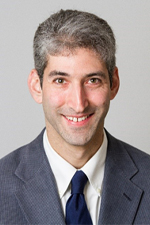
Deputy Director for Implementation Science, National Cancer Institute
David Chambers, D.Phil., is Deputy Director for Implementation Science in the Office of the Director in the Division of Cancer Control and Population Sciences (DCCPS) at the National Cancer Institute (NCI). Chambers manages a team focusing on efforts to build and advance the field of Implementation Science (IS) through funding opportunity announcements, training programs, research activities, dissemination platforms, and enhancement of partnerships and networks to integrate research, practice, and policy. From 2008 through the fall of 2014, Chambers served as Chief of the Services Research and Clinical Epidemiology Branch (SRCEB) of the Division of Services and Intervention Research at the National Institute of Mental Health (NIMH). He arrived at NIMH in 2001, brought to the Institute to run the Dissemination and Implementation Research Program within SRCEB, developing a portfolio of grants to study the integration of scientific findings and effective clinical practices in mental health within real-world service settings. From 2006 to the fall of 2014, Chambers also served as Associate Director for Dissemination and Implementation Research, leading NIH initiatives around the coordination of dissemination and implementation research in health, including a set of research announcements across 15 of the NIH Institutes and Centers, annual scientific conferences, and a summer training institute. He publishes on strategic research directions in implementation science and serves as a plenary speaker at numerous scientific conferences. He received his A.B. degree (with Honors) in Economics from Brown University in 1997, and an M.Sc. and D.Phil. degree in Management Studies (Organisational Behaviour) in 1998 and 2001, respectively, from Oxford University (United Kingdom).
Karletta Chief (Diné)
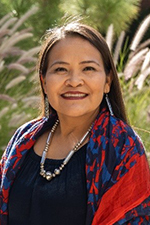
Panelist
Karletta Chief (Diné), Ph.D., is an Associate Professor and Extension Specialist in the Department of Environmental Science at the University of Arizona. She is also the Director of the Indigenous Resilience Center. As an Extension Specialist, she works to bring relevant water science to Native American communities in a culturally sensitive manner. The Indigenous Resilience Center aims to facilitate efforts of UArizona climate/environment researchers, faculty, staff, and students working with Native Nations to build resiliency to climate impacts and environmental challenges. Two of her primary tribal projects are The Pyramid Lake Paiute Tribe Climate Adaptation and Traditional Knowledge Project and Gold King Mine Spill Diné Exposure Project. In partnership with Diné College, Chief leads the National Science Foundation (NSF) Indigenous Food, Energy, and Water Security and Sovereignty Program and is training 39 graduate students. Indige-FEWSS’s vision is to develop a diverse workforce with intercultural awareness and expertise in sustainable food, energy, and water systems (FEWS), specifically through off grid technologies to address the lack of safe water, energy, and food security in Indigenous communities. Chief received a B.S. and M.S. in Civil and Environmental Engineering from Stanford University in 1998 and 2000 and a Ph.D. in Hydrology and Water Resources from UA in 2007.
Gwen Collman
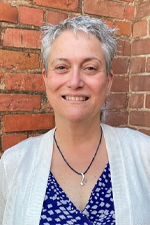
Panelist
Gwen Collman, Ph.D., is Senior Advisor to the Director and provides leadership on the planning and implementation of complex high priority research programs in many areas of environmental health sciences including public health, population science, and community engagement. Over the past two years, she has been actively involved in the NIH wide RADxUP and CEAL research programs that focus on COVID testing, vaccine hesitancy and community engagement. Currently Collman is the strategic advisor for coordination of the NIH wide Climate Change and Health Program. Collman holds a Ph.D. in environmental epidemiology from the Gillings School of Public Health at the University of North Carolina. During her career at NIEHS she has held positions in the intramural program, extramural program, and the Office of the Director. She is a member of the NIEHS leadership team.
Jim Dearing

Panelist
Jim Dearing, Ph.D., is Brandt Endowed Professor in the Department of Communication at Michigan State University. Dearing studies the diffusion of innovations, including the adoption and implementation of new evidence-based practices, programs, technologies, and policies. His research and teaching spans dissemination science, implementation science, program sustainability, and the psychological and sociological basis of the diffusion process. He works with research and practice improvement teams in environmental remediation, nursing care, water conservation, injury and fatality prevention, public health, and healthcare. He has been PI for research grants from the National Science Foundation (NSF), the Environmental Protection Agency (EPA), the National Cancer Institute (NCI), the Agency for Healthcare Research and Quality (AHQR), and private foundations including the Robert Wood Johnson Foundation, The Wallace Foundation, W.K. Kellogg Foundation, John D. and Catherine T. MacArthur Foundation, and the Bill & Melinda Gates Foundation. He is a fellow of the International Communication Association. Currently, Dearing co-leads a study assessing the implementation of Project ECHO at 35 sites in North America and will work with U.S. Centers for Disease Control and Prevention staff to diffuse innovations in opioid prevention.
Natasha DeJarnett

Panelist
Natasha DeJarnett, Ph.D., (she/her) is an assistant professor in the Christina Lee Brown Envirome Institute at the University of Louisville Division of Environmental Medicine researching the health impacts of extreme heat exposure and environmental health disparities. In addition, she is a professorial lecturer in Environmental and Occupational Health at the George Washington University Milken Institute School of Public Health. Previously, DeJarnett was interim associate director of Program and Partnership Development at the National Environmental Health Association, leading research, climate and health, and children’s environmental health. She also previously served as a policy analyst at the American Public Health Association (APHA), where she led the Natural Environment portfolio, including air and water exposures along with climate change. DeJarnett is a member of the Environmental Protection Agency (EPA)’s Children’s Health Protection Advisory Committee, is chair of the Governing Board of Citizens’ Climate Education, a president-elect of the Board of Directors of Physicians for Social Responsibility, chair-elect for APHA’s Environment Section, member of the Advisory Board of APHA’s Center for Climate, Health and Equity, a member of the Board of Trustees for the BTS Center, special advisor to the Environmental Health and Equity Collaborative, and a Steering Committee member of the International Transformational Resilience Coalition.
Nicole Errett

Panelist
Nicole Errett, Ph.D., M.S.P.H., is an Assistant Professor in the Department of Environmental and Occupational Health Sciences at the University of Washington. Her research focuses on the development, implementation and health impacts of policies and programs in the context of public health emergencies, disasters, and climate change. At the University of Washington, Errett co-directs the Collaborative on Extreme Event Resilience (CEER), a research lab focused on applied, community-engaged research to understand and improve resilience to disasters and the acute impacts of climate change. She directs the Community Engagement Core for the NIEHS-funded EDGE Center and co-chairs the NIEHS Disaster Research Response Network Steering Committee. Errett previously served as the Special Assistant to the Assistant Secretary of Preparedness and Response at the US Department of Health and Human Services, the Policy and Legislative Director at the Baltimore City Mayor’s Office of Emergency Management and the Evaluation and Assessment Manager at the Northwest Healthcare Response Network. She holds a Ph.D. in Health and Public Policy, an M.S.P.H. in Health Policy and a BA in Public Health Studies from the Johns Hopkins University. She completed post-doctoral training in coastal community resilience at the University of British Columbia’s School of Community and Regional Planning.
Maria Fernandez

Panelist
Maria Fernandez, Ph.D., is Professor of Health Promotion and Behavioral Sciences and Director of the Center for Health Promotion and Prevention Research at University of Texas School of Public Health. She is the Director of the Texas Prevention Research Center (PRC) and the founding co-Director of the new UTHealth Institute for Implementation Science. Her research focuses on chronic disease prevention and control among underserved populations. She has extensive expertise in health equity research, research translation and dissemination and implementation (D&I) research. She has been a member of the NIH D&I Research in Health Study Section and served as faculty for the NCI-sponsored Training Institute for Dissemination and Implementation Research in Health. As the Principal Investigator on multiple NIH, CDC, and State-funded D&I studies, she has developed tools and measures for implementation research and practice to improve health equity for vulnerable populations. For example, she was the PI on an NCI-funded R01 that developed and evaluated an online tool to facilitate adoption, adaptation, and implementation of evidence-based cancer prevention programs. She leads a study to develop and validate a measure of organizational readiness for implementation, and a study to increase uptake and use of effective cancer screening interventions in community health centers serving low income and minority patients and communities. Fernandez is an expert on Intervention Mapping (IM), a systematic process for planning multilevel interventions, and has pioneered the use IM in implementation science.
Russell Glasgow
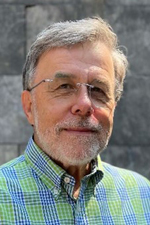
Panelist
Russell Glasgow, Ph.D., is the Director of the Dissemination and Implementation Science Program of Adult & Child Consortium for Health Outcomes Research & Delivery Science (ACCORDS) and research professor in the Department of Family Medicine at the University of Colorado School of Medicine. From 2010- 2014, he was Deputy Director for Implementation Science in the Division of Cancer Control and Population Science at the U.S. National Cancer Institute. Glasgow is one of the original developers of the RE-AIM (www.re-aim.org), PRISM and Dynamic Sustainability frameworks. He currently directs an NCI funded implementation science center. Glasgow was trained as a clinical psychologist and has worked at the interface of individual, organizational, community and population health related interventions. He is an implementation scientist whose work focuses on public health issues of studying and enhancing the reach and adoption of evidence-based programs; adaptation and context; and pragmatic research methods and measures to enhance health equity and sustainment. Glasgow has published over 500 articles, been the PI on 25 NIH or AHRQ grants, and is among the top 1% of most frequently cited social scientists (Clarivate). He currently focuses much of his time on mentoring, training, and building capacity in implementation science and is Multiple PI on the University of Colorado NHLBI funded K12 training program in implementation science.
Chris Gordon

Panel Moderator & Workshop Planning Committee
Chris Gordon, Ph.D., is Chief of the HIV Prevention and Care Continuum, Co-Morbidities, and Translational Research Branch at the Division of AIDS Research at the National Institute of Mental Health (NIMH). His primary sets of responsibilities involve development of new programmatic foci and initiatives, administration of currently funded research, and building scientific collaborations among other institutes, agencies, and community/clinical sites. Gordon coordinates the Division of AIDS Research activities in Dissemination and Implementation Research, leads the NIMH Centers program, and is the NIMH representative on the Centers for AIDS Research (CFAR) program Steering Committee.
Christine Hunter
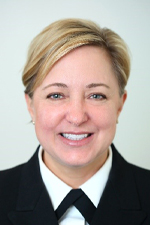
Acting Director, Office of Behavioral and Social Sciences Research
Christine Hunter, Ph.D., is the Acting Associate Director for Behavioral and Social Sciences Research, and Acting Director of the Office of Behavioral and Social Sciences Research at the National Institutes of Health (NIH). In these roles, she supports the OBSSR mission to enhance the impact of health-related behavioral and social sciences research, coordinate and integrate these sciences within the larger NIH research enterprise and communicate health-related behavioral and social sciences research findings. Hunter is also a Captain in the U.S. Public Health Service. Previously she served as the Director of Behavioral Research at the National Institute of Diabetes and Digestive and Kidney Diseases (NIDDK), where she built an innovative and diverse behavioral science portfolio focused on diabetes and obesity research. Hunter obtained her Ph.D. in Clinical Psychology from The University of Memphis and completed her psychology internship at Wilford Hall Medical Center in 1997. She completed a Postdoctoral Fellowship in Clinical Health Psychology in 2001 and was Board Certified in Clinical Health Psychology in 2005 by the American Board of Professional Psychology. Prior to joining NIDDK in 2006, she served on active duty in the U.S. Air Force for ten years in a variety of clinical, management, research, and policy positions. Hunter's research interests span the translational spectrum and include an emphasis on advancing behavioral ontology development and the application of rigorous but varied methods and designs in the behavioral and social sciences. With the goal of developing and testing more targeted and efficacious health behavior change interventions, she’s interested in research to uncover mechanisms of behavior change, understand individual differences in treatment response, and translate basic science finding into meaningful human application. She is also interested in implementation science to more rapidly advance the reach, uptake, adaptation, and scale up of effective approaches to improve health and mental health into routine care, community settings, and public health practice.
Tamarra James-Todd

Panelist
Tamarra James-Todd, Ph.D., is an environmental reproductive epidemiologist researching the role of environmental chemicals on women’s cardiometabolic health across the reproductive lifecourse. Her work focuses on pregnancy as a sensitive window of environmental chemical exposures as it relates to environmental and reproductive justice issues. James-Todd is the Principal Investigator of two NIEHS funded R01 grants, focusing on endocrine disrupting chemicals and adverse maternal health outcomes during pregnancy, postpartum and mid-life in the ERGO study and Project Viva. She is also a co-investigator on the Health Outcomes around Pregnancy and Exposure to HIV/ARVs (HOPE) Study, as well as the Director of the Organics Core for the Harvard Chan NIEHS Center. James-Todd serves as the Principal Investigator for the Community Engagement Core of the Metals and Metal Mixtures: Cognitive Aging, Remediation, and Exposure Sources (MEMCARE) P42 Superfund Research Center. She has had the honor of serving on the Environmental Protection Agency (EPA)’s Scientific Advisory Board for the Chemical Assessment Advisory Committee, as well as two National Academies of Sciences, Engineering, and Medicine’s committees and the March of Dimes Environmental Justice Working Group.
Katrina Korfmacher
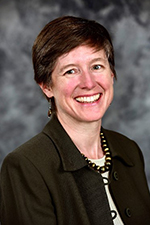
Panelist
Katrina Smith Korfmacher, Ph.D., is Professor of Environmental Medicine and Director of Community Engagement for the Environmental Health Sciences Center (EHSC) at the University of Rochester. She is a policy scientist who holds a M.S. in Water Quality Management and Ph.D. in Environmental Studies from Duke University. Korfmacher has worked with and studied community partnerships related to childhood lead poisoning prevention, healthy homes, air quality, land use, and other environmental justice issues for 20 years. She is the author of “Bridging Silos: Collaborating for Environmental Health and Justice in Urban Communities” (MIT Press, 2019), which explores how to promote local problem solving through community partnerships. Since June 2020, she has coordinated the Monroe County Wastewater Coronavirus Surveillance Working Group and studied application of this technology in colleges and universities nationwide.
Marion Koso-Thomas

Panel Moderator & Workshop Planning Committee
Marion Koso-Thomas, M.D., graduated from the University of Sierra Leone with a Bachelor of Science with Honors (B.SC Hons) and Bachelor’s in Medicine and Surgery (M.B. Ch.B). She received her pediatric training from the University of Illinois in Chicago and the Georgetown University Medical Center. She worked as a clinician for 10 years before embarking on her career in public health by obtaining a Masters in Public Health from the Johns Hopkins University. She joined NICHD in 2008 and is a program official for the Pregnancy and Perinatology branch, overseeing a broad range of neonatal and pediatric grants. She is a significant contributor to the NICHD mission and vision as pertains to Dissemination and Implementation Science.
Meghan Lane-Fall

Keynote Speaker
Meghan Lane-Fall, M.D., M.S.H.P., is a critical care anesthesiologist and physician-scientist committed to the provision of safe, effective patient care. Her research agenda is focused on implementation science – the empiric study of strategies to facilitate the uptake and sustained use of evidence-based practices. Her research is based in hospital settings and interweaves concepts from implementation science and human factors engineering to design and implement interventions that complement clinician workflow. She collaborates on a wide range of projects, including work focused on maternal health and structural racism. In addition to her research, Lane-Fall is deeply engaged in building research capacity in health services research; she mentors junior faculty, research fellows, and health professions students and co-directs Penn’s three graduate level implementation science courses. Lane-Fall is the founding Co-Director of the Penn Center for Perioperative Outcomes Research and Transformation and the Director of Acute Care Implementation Research at the Penn Implementation Science Center at the Leonard Davis Institute of Health Economics. She is Vice Chair of Inclusion, Diversity, and Equity and David E. Longnecker Associate Professor of Anesthesiology and Critical Care with a secondary appointment in Epidemiology at the University of Pennsylvania.
Deborah Linares

Workshop Planning Committee
Deborah Linares, Ph.D., M.A., is a Health Scientist Administrator (Program Official) in the Division of Integrative Biological and Behavioral Sciences at the National Institute on Minority Health and Health Disparities (NIMHD). She focuses on promoting research to understand behavioral and interpersonal factors contributing to resilience and susceptibility to adverse health conditions among disadvantaged and underserved populations. She provides expertise in conducting minority health and health disparities research in the areas of behavioral health, women’s health, and child development. Prior to joining NIMHD, Linares worked as a Health Scientist/Program Officer at the Health Resources and Services Administration (HRSA) in the Maternal and Child Health Bureau, where she managed maternal and child health research programs focusing on behavioral interventions for children with autism, improving systems of care for children with special health care needs among underserved populations, and other topics. Linares also worked at the U.S. Government Accountability Office conducting HHS program evaluations. Linares holds a Doctor of Philosophy in Community Health from the University of Illinois, Urbana-Champaign, where she studied behavioral health, survey measurement development, and program evaluation. She also holds a Master of Arts in Psychology from California State University, Los Angeles.
Lindsey Ann Martin

Speaker & Workshop Co-Chair
Lindsey Ann Martin, Ph.D., is a Health Scientist Administrator in the Population Health Branch. Lindsey is a medical anthropologist and supports a broad environmental health portfolio focused on environmental health disparities, community-based research approaches and implementation/dissemination sciences. Martin joined NIEHS in January 2020 from the Center for Innovations in Quality, Effectiveness & Safety (IQuESt) at the Michael E. DeBakey VA Medical Center in Houston, Texas. She served as the lead qualitative methodologist in IQuESt’s Methodology & Analytics Core for five years and was Faculty Advisor to IQuESt’s Veteran Community Engagement Committee. Martin also had an active role in the VA’s National Workgroup on Veteran Engagement. Martin graduated with her B.A., M.A., and Ph.D. in anthropology from Wayne State University (WSU) in Detroit, Michigan. She also earned a graduate certificate in Public Health Practice from the WSU School of Medicine and was selected to participate in the NIH Training Institute for Dissemination & Implementation Research in Health program in 2017.
Glen Mays

Panelist
Glen P. Mays, Ph.D., M.P.H., is professor and chair of the Department of Health Systems, Management and Policy in the University of Colorado School of Public Health. His research seeks to understand and solve coordination problems within and across the healthcare, public health and social service sectors. On a national level, Mays leads the Systems for Action Research program funded by the Robert Wood Johnson Foundation, which studies strategies for aligning delivery and financing systems across sectors in ways that improve population health. As part of this work, Mays created and maintains the National Longitudinal Survey of Public Health Systems that has followed a nationally-representative cohort of U.S. communities since 1998 to examine inter-organizational approaches to public health delivery and financing. Mays also studies ways of improving health and social system coordination in preparing for large-scale hazardous events, with funding from the U.S. Centers for Disease Control and Prevention and the Robert Wood Johnson Foundation. A third area of inquiry focuses on coordination of health and social services for high-risk patients transitioning from hospital to community settings, with funding from Patient-Centered Outcomes Research Institute (PCORI) and Agency for Healthcare Research and Quality (AHRQ). Mays received an undergraduate degree in political science from Brown University, earned MPH and Ph.D. degrees in health services research from UNC-Chapel Hill, and completed a postdoctoral fellowship in health economics at Harvard Medical School.
George A. Mensah

Director of The Center for Translation Research and Implemenation Science (CTRIS), National Heart, Lung, and Blood Institute
George Mensah, M.D., is a clinician-scientist who currently serves as the Director of the Center for Translation Research and Implementation Science at the National Heart, Lung, and Blood Institute (NHLBI), a part of the National Institutes of Health (NIH). In this role, Mensah leads an NHLBI-wide effort to advance late-stage translational research and implementation science to address gaps in the detection, prevention, treatment, and control of heart, lung, and blood diseases and sleep disorders, and the elimination of related health disparities. His goal is to maximize the health impact of advances made in fundamental discoveries, clinical and translational research, and population science research. Mensah is an honors graduate of Harvard University. He obtained his medical degree from Washington University and trained in Internal Medicine and Cardiology at Cornell. His professional experience includes more than 25 years of public health service at the U.S. Department of Veterans Affairs, the Centers for Disease Control and Prevention (CDC), and the NIH. In addition to his public service, Mensah had 15 years of experience in direct patient care, teaching, and research at Cornell, Vanderbilt, and the Medical College of Georgia (MCG). He was a full professor with tenure at MCG and is currently a Visiting Full Professor at the University of Cape Town, South Africa. Mensah has been admitted to fellowships in several national and international societies including the American Heart Association, American College of Cardiology, and the European Society of Cardiology. He is an Honorary Fellow of the College of Physicians of South Africa and a Life Member of the Association of Black Cardiologists. His recent honors include the 2020 Alumni Achievement Award from Washington University School of Medicine; the 2020 Alpha Omega Alpha Medical Honor Society Visiting Professorship at Morehouse School of Medicine; and the 2020 Ancel Keys Memorial Lecturer at the American Heart Association Scientific Sessions. Mensah maintains active collaboration with several international groups to advance research on the global burden of diseases and risk factors.
Aubrey Miller

Panelist
Aubrey K. Miller, M.D., M.P.H., retired Captain USPHS, is board certified in Occupational and Environmental Medicine. He is currently the Senior Medical Advisor to the Director of the National Institute of Environmental Health Sciences (NIEHS), where he supervises a portfolio of programs involving global environmental health and climate change, disaster research, and environmental toxics, as well as legislative, policy, strategic planning, and coordination of environmental health issues and activities among U.S. federal agencies, congress, academia, and other stakeholders. His experiences include numerous public health investigations and research studies involving a wide range of occupational and environmental health issues. He has contributed to the leadership and management of numerous disaster responses including the Libby, Montana, Public Health Emergency involving widespread asbestos contamination, Katrina and other major hurricanes, the World Trade Center and anthrax attacks, the Gulf Oil Spill, and the H1N1 influenza, Ebola, Zika, and COVID-19 infectious outbreaks. He currently Co-Chairs the new NIH Climate Change and Health Initiative to develop needed research, capacity building, and training in the US and globally. He also directs the NIH Public Health Emergency and Disaster Research Response (DR2) Program which focuses on improving national and international disaster research capabilities through enhancing policies, infrastructure, training, and integration of stakeholders, especially academia and impacted communities. He received a B.S. in biology, B.A. in political science, and M.P.H. in environmental and occupational health at the University of Illinois, and his MD at Rush Medical College. His 30+ year career includes service as a CDC Epidemiology Intelligence Service (EIS) officer and senior medical officer positions with CDC/NIOSH, the HHS Office of the Secretary, Environmental Protection Agency (EPA), and Food and Drug Administration (FDA).
Gila Neta

Panel Moderator & Workshop Co-Chair
Panel Moderator & Workshop Co-Chair Gila Neta, Ph.D., M.P.P., is an epidemiologist and program director for Implementation Science in the Office of the Director in the Division of Cancer Control and Population Sciences (DCCPS) at the National Cancer Institute (NCI). Neta serves as the NCI scientific lead for the funding announcements in Dissemination and Implementation Research in Health and assists with research and training activities related to implementation science across the Division. She has a secondary appointment within the Epidemiology and Genomics Research Program. Neta’s programmatic and research interests within implementation science include training, portfolio analysis, the use of PRECIS criteria in evaluating pragmatic trials, shared decision making and cancer screening, economic evaluation, de-implementation, and the use of standardized measurement and reporting. Neta is Co-Chair of the NIH-sponsored Annual Conference on the Science of Dissemination and Implementation. She also leads the NIH D&I working group, a trans-NIH initiative providing leadership and vision for implementation science across the NIH. Prior to joining DCCPS in May 2013, Neta conducted postdoctoral research within the Division of Cancer Epidemiology and Genetics in the Radiation Epidemiology Branch, focusing on the potential unintended health effects of radiologic medical technologies. Neta received her Master of Public Policy degree at the University of California at Berkeley in 2001, and her Doctorate in Epidemiology from Johns Hopkins University Bloomberg School of Public Health in 2009. She conducted her doctoral dissertation work at the Eunice Kennedy Shriver National Institute for Child Health and Human Development.
Liam O’Fallon
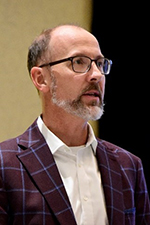
Panelist
Liam O’Fallon, M.A., joined the Division of Extramural Research and Training in 1999, he has been actively involved in research programs at the National Institute of Environmental Health Sciences that support community participation in research. O’Fallon leads the Partnerships for Environmental Public Health program at NIEHS, which fosters interactions among projects from different NIEHS-funded programs with a focus on community engagement and a commitment to public health action. He directs the Community Engagement Cores that are a part of the network of Environmental Health Science Core Centers. He is the program officer for the Research to Action Program that requires projects to use community-engaged research methods to conduct and to translate research findings into public health action. O’Fallon is particularly interested in communication research in the context of environmental public health and health disparities. Before coming to NIEHS, O’Fallon worked at the U.S. Department of Health and Human Services, in the Office of International and Refugee Health where he coordinated an interagency, binational working group addressing environmental health issues along the U.S.-Mexico Border.
Kristianna Pettibone

Workshop Planning Committee
Kristianna (Kristi) Pettibone, Ph.D., has more than 20 years’ experience managing, directing, and guiding public health policy research and evaluation projects. She holds a Ph.D. in Policy Sciences (health policy concentration) from the University of Maryland, Baltimore County. Prior to joining NIEHS, she served as director of the MayaTech Corporation’s Center for Community Prevention and Treatment Research. Pettibone has worked on evaluations of several federal grant portfolios including CDC’s Injury Control Research Centers and NIEHS’s Environmental Health Core Centers Program. She led an NIEHS workgroup in the development of a new translational research framework and developed a Team Science Workbook for NIEHS program staff.
Nishadi Rajapakse
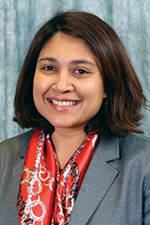
Workshop Planning Committee
Nishadi Rajapakse, Ph.D., is a program director in the Health Inequities and Global Health branch within the Center for Translation Research and Implementation Science. At NHLBI, she serves as a program officer for Global Alliance for Chronic Disease (GACD), NIH Community Engagement Alliance (CEAL) and NIH Climate Change & Health (CCH) initiatives. Prior to NHLBI, she spent 10 years at the National Institute on Minority Health and Health Disparities (NIMHD) where she directed several initiatives focused on health disparities-the Transdisciplinary Collaborative Centers for and Health Disparities Research Focused on Precision Medicine (U54) initiative and the Centers of Excellence on Environmental Health Disparities Research Program. She also co-led the successful launch of the APOL1 Long-term Kidney Transplantation Outcomes Network (APOLLO) Clinical Centers (Collaborative U01).
Rajapakse received her Ph.D. in Molecular Medicine & Translational Sciences from Wake Forest University and a master’s degree in clinical research from Duke University. She completed her postdoctoral fellowship at the National Institutes of Environmental Health Sciences (NIEHS). She has served as a guest editor for the Journal of Health Care for the Poor and Underserved and received numerous awards, including NIH and Institute director awards.
Lisa Saldana
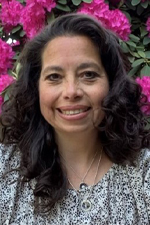
Panelist
Lisa Saldana, Ph.D., is a Senior Scientist at Oregon Social Learning Center, with a research emphasis in evidence-based practice in public serving systems. Her clinical and research emphasis involves addressing the needs of families involved in public system. A clinical psychologist by training, she is an implementation scientist focused on the development, evaluation, and implementation of prevention-focused EBPs. Saldana is the developer of the FAIR- Families Actively Improving Relationships model, an integrative treatment for parental opioid and/or methamphetamine abuse and child neglect. She also is the developer of the R3 supervisor implementation strategy for the child welfare workforce, an evidence-based approach to improve the culture and climate of child welfare systems, with a focus on infusing the use of evidence-based strategies in all interactions with families. Finally, Saldana is the primary developer of the Stages of Implementation Completion (SIC) and Cost of Implementing New Strategies (COINS) measures of implementation process, milestones, and resource use. The SIC and COINS tools have been used to track over 1,900 implementations of different behavioral and physical healthcare programs worldwide. Saldana has served as a mentor to many junior investigators with an interest in implementation science and evidence-based practice in public service systems.
Perry Sheffield

Panelist
Perry Sheffield, M.D., M.P.H., is an Associate Professor in Environmental Medicine and Public Health and Pediatrics at the Icahn School of Medicine at Mount Sinai in New York City where she co-leads the children’s environmental health team. For the US EPA Region 2 Pediatric Environmental Health Specialty Unit serving New Jersey, New York, Puerto Rico, and the U.S. Virgin Islands, she leads the Caribbean initiative. Her research focuses on the health effects of climate change and adaptation strategies with a focus on children and climate justice. Her current work includes exploring children’s vulnerability to heat. She completed her medical degree from the Medical College of Georgia, a Pediatrics residency at Johns Hopkins, and a Pediatric Environmental Health fellowship and Masters of Public Health at Mount Sinai. She teaches at Mount Sinai and Columbia University Mailman School of Public Health and leads the Climate Change Curriculum Infusion project at Mount Sinai. She is a member of the US EPA Children’s Health Protection Federal Advisory Committee; and a Co-Chair of the Health and Safety Working Group on the forthcoming New York State Climate Impacts Assessment.
Rachel Shelton

Panelist
Rachel C. Shelton, Sc.D., M.P.H., is a social and behavioral scientist with training in cancer and social epidemiology, and expertise in implementation science, sustainability, health equity, and community-based participatory research. She is Associate Professor of Sociomedical Sciences at Columbia University’s Mailman School of Public Health, where she is Co-Director of the Community Engagement Core Resource at the Irving Institute for Clinical and Translational Research (CTSA); through the CTSA, she leads a new university-wide Implementation Science Initiative to build research and training capacity in implementation science. Shelton has taught and provided mentorship through implementation science courses and trainings nationally and globally for nearly ten years, including TIDIRC, TIDIRH, and the Institute for Implementation Science Scholars (IS-2). She has 15 years of experience conducting mixed-methods research focused on advancing the implementation and sustainability of evidence-based interventions in community and clinical settings to address health inequities and promote equity, particularly in the context of cancer; her research program is funded by NIA, NCI, NIMHD and American Cancer Society.
Keisha Shropshire
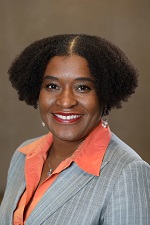
Workshop Planning Committee
Keisha L. Shropshire, M.P.H., joined the Office of Disease Prevention (ODP) in May 2015 and currently serves as a Health Science Policy Analyst. In this role, she leads the planning, execution, and evaluation of the Pathways to Prevention workshops to identify research needs and gaps and coordinates collaborative partnerships and efforts in prevention research across the NIH and among external stakeholders. Shropshire also manages other tasks including tracking and monitoring legislative activities, coordinating reporting activities across the office, and promoting the adoption and integration of evidence-based practices and policies into health care and public health settings. Prior to joining the ODP, Shropshire was a Health Science Analyst at the National Institute of Mental Health where she conducted strategic planning, science policy analysis, and program evaluation activities within the Science Policy and Evaluation Branch. Before NIMH, Shropshire held positions at the local and state levels to develop policy and programs in various public health areas, including HIV/AIDS, tobacco cessation, adolescent health and nutrition, and mental health. Shropshire earned a Bachelor of Arts in biology from Agnes Scott College and a Master of Public Health with a concentration in health policy and community health and prevention from Drexel University School of Public Health. With this expertise, Shropshire has guided numerous strategic projects, managed teams, fostered partnerships, and synthesized information into actionable items to inform public health research agendas, policy, and decision-making at different organizational levels.
Veena Singla

Panelist
Veena Singla, Ph.D., is a Senior Scientist with the Natural Resources Defense Council. She focuses on creating healthier indoor environments, including advancing safe and sustainable materials in the built environment and everyday products. She investigates how toxic chemicals and harmful environmental exposures threaten the health of vulnerable populations, including pregnant women, children, and workers. Her research uses an interdisciplinary approach incorporating environmental health, exposure science, public health and policy expertise. Singla specializes in the communication of complex scientific information at the intersection of research and policy and has testified to the Consumer Product Safety Commission, the Alaska state legislature, and the San Francisco Board of Supervisors. She currently serves on the US EPA's Children's Health Protection Advisory Committee, the National Toxicology Program Board of Scientific Counselors, and the Board of Directors for Clean Production Action. Singla previously was the Associate Director of Science and Policy at the Program on Reproductive Health and the Environment at the University of California, San Francisco (UCSF). She completed a postdoctoral teaching fellowship at Stanford University and was an adjunct faculty member at the University of San Francisco. She holds a bachelor’s degree from the University of California, Berkeley, and a Ph.D. in cell biology from UCSF.
Melissa Smarr

Panelist
Melissa Smarr, Ph.D., is a Health Scientist Administrator in the Population Health Branch in the Division of Extramural Research and Training at the National Institute of Environmental Health Sciences (NIEHS). Her broad research portfolio includes reproductive health, metabolic health across the life course, environmental epidemiology, environmental health disparities and environmental justice. Smarr received her doctorate in Environmental Health Sciences from the University of Michigan School of Public Health, specializing in Occupational and Environmental Epidemiology. Prior to joining NIEHS, Smarr completed a postdoctoral and a research fellowship at the then titled Division of Intramural Population Health Research at the Eunice Kennedy Shriver National Institute of Child Health and Human Development. She then joined the faculty at Emory University as a Tenure-Track Assistant Professor in the Rollins School of Public Health. During her time at Emory, Smarr was a Co-Investigator with the P30 HERCULES Exposome Research Center and the P50 Center for Children’s Health, the Environment, the Microbiome, and Metabolomics. As a Faculty Fellow in the Office of Sustainability Initiatives, Smarr developed and taught the Environmental Justice: Theory and Public Health Practice course and served as a mentor for the Break the Cycle of Children’s Environmental Health Disparities program.
Gina South
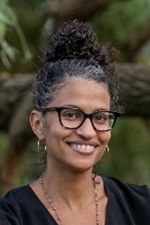
Panelist
Eugenia (Gina) South, M.D., M.S.P.H., is Assistant Professor of Emergency Medicine at Penn’s Perelman School of Medicine where she serves as the Vice Chair for Inclusion, Diversity, and Equity. She is also the Faculty Director for the Penn Urban Health Lab. South’s research agenda is focused on dismantling structural racism and promoting environmental and economic justice. Her lab develops and tests individual and neighborhood level interventions to improve health and wellbeing for residents in Black and other minoritized communities. She has studied a variety of place-based interventions including vacant lot greening, abandoned house remediation, tree planting, and structural repairs to homes. Her research is funded by the National Institutes of Health, the Robert Wood Johnson Foundation and the Centers for Disease Control and Prevention. Her work has been published in JAMA, PNAS, and AJPH, as well as been covered by national and international media outlets such as the New York Times, Washington Post, NPR, and Time Magazine.
Rachel Sturke

Workshop Planning Committee
Rachel Sturke, Ph.D., M.P.H., MIA, joined the Fogarty International Center at the NIH in 2006 and currently serves as Deputy Director and Senior Scientist in the Division of International Science Policy, Planning, and Evaluation and the Center for Global Health Studies. In this role, she oversees a portfolio of global implementation science projects and the program evaluation portfolio for Fogarty. Sturke’s work in implementation science includes a focus on building research capacity in implementation science in low- and middle-income countries and using innovative platforms to bring implementation scientists together with decision-makers and program implementers from LMICs. Sturke has worked extensively in India, Ecuador, Peru, and sub-Saharan Africa. She is an active member of the NIH Dissemination and Implementation Science Working Group, leads a trans-NIH working group focusing on building capacity for global implementation science, and has co-chaired the global track for the NIH-sponsored Annual Conference on the Science of Dissemination and Implementation for several years. Sturke obtained her Ph.D. in population, reproductive, and women’s health from Johns Hopkins University Bloomberg School of Public Health with a focus on gender, violence and HIV in South India. She received both a Masters in Public Health and a Masters in International Affairs from Columbia University.
Claudia Thompson

Speaker
Claudia Thompson, Ph.D., is the branch chief for the Population Health Branch. She joined the Division of Extramural Research and Training in 1994 as a program administrator for the Superfund Research Program and was also responsible for building the grant portfolio in the scientific areas of biomarker (exposure, effect, and susceptibility) development, metabolic toxicology, chemical mixtures research and molecular mechanisms of metal toxicity and carcinogenicity. Thompson received her B.S. in biology from Bradley University in Peoria, Ill., and her Ph.D. in biochemistry and nutrition from the University of North Carolina at Chapel Hill. Prior to joining DERT in 1994, Claudia was a research scientist for 10 years in the Laboratory of Biochemical Risk Analysis in the Division of Intramural Research at NIEHS.
Lisa Thompson

Panelist
Lisa Thompson, RN, Ph.D., M.S., is an Associate Professor at Emory University in the School of Nursing, with a secondary appointment in the Department of Environmental Health at Rollins School of Public Health. The focus of Thompson’s research is to evaluate effective behavioral interventions to reduce household-level air pollution that can be implemented in real-world settings. She has spent the past 18 years working on research projects related to household air pollution in rural Guatemala, starting as a graduate student at the University of California, Berkeley on an NIEHS-funded randomized stove intervention study on infant pneumonia (RESPIRE study, Kirk Smith, Ph.D., M.P.H., PI). Currently she is a Co-Investigator on the HAPIN trial, a randomized controlled trial of a liquid petroleum gas stove and fuel distribution in 3,200 households in four countries (India, Guatemala, Peru, and Rwanda). This study aims to deliver evidence regarding the health benefits of a liquefied petroleum gas stove and free fuel intervention on children during the first year of life. She is currently conducting a cluster randomized trial in rural Guatemala, referred to as ECOLECTIVOS, that is one of the first implementation science study to develop and evaluate community-level working groups that aim to reduce household burning of plastic waste.
Brittany Trottier

Workshop Planning Committee
Brittany Trottier, M.P.H., joined the NIEHS Division of Extramural Research and Training in 2017 as a Health Specialist with the Superfund Research Program (SRP). She provides program analysis and support of SRP activities, supports communication of SRP grantees’ scientific accomplishments, and serves as the lead for SRP community engagement activities. She received her Master’s in Public Health from the Milken Institute School of Public Health of The George Washington University and has a Bachelor of Arts in Chemistry from Adrian College.
Rick Woychik
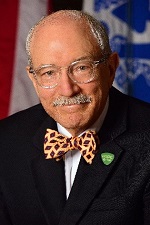
Director, National Institute of Environmental Health Sciences
Richard Woychik, Ph.D., became the Director of the National Institute of Environmental Health Sciences (NIEHS), one of the National Institutes of Health (NIH), and the National Toxicology Program on June 7, 2020. In these roles, Woychik oversees federal funding for biomedical research to discover how the environment influences human health and disease. Prior to becoming Director and since 2011, Woychik served as Deputy Director of NIEHS. In this role, he assisted the former NIEHS Director, Linda Birnbaum, Ph.D., in the formulation and implementation of plans and policies necessary to carry out the NIEHS missions and the administrative management of NIEHS.
As a mammalian geneticist, Woychik has had several noteworthy accomplishments. His laboratory was the first to clone and characterize the gene called agouti, which provided molecular insights into obesity and the satiety response in the brain. Additionally, his laboratory was the first to identify a gene mutation associated with polycystic kidney disease, which provided insights into this molecular biology of this important human disease. Also, his laboratory was the first to determine that a member of the protocadherin family was associated with the hearing loss in a mouse model that was ultimately paved the way to better understanding the molecular basis of Usher syndrome type 1F in humans. More recently his research program has been focused on investigating the molecular mechanisms associated with how environmental agents influence the epigenetic control of gene expression.
Ami Zota

Panelist
Ami Zota, Sc.D., M.S., is an associate professor at the Department of Environmental & Occupational Health at the George Washington University Milken Institute School of Public Health and an incoming associate professor in the Department of Environmental Health Sciences at Columbia University Mailman School of Public Health (starting June 2022). Her work seeks to secure environmental justice and improve health equity through science, advocacy, communication, and training next generation scientists. Her current research examines how social-structural factors, such as racism, classism, and sexism, shape environmental chemical exposures and health inequities in women across the life course. Zota is equally committed to science communication. Her work has been featured in high-impact media publications including the Washington Post, USA Today, and the Atlantic Monthly and has helped shape health and safety standards for consumer product chemicals. Zota is also active in multiple efforts to increase diversity, equity, and inclusion in the scientific enterprise. She is the founder and director of the Agents of Change in Environmental Justice, a nationwide program that empowers emerging leaders from historically excluded backgrounds in science and academia to reimagine solutions for a just and healthy planet. In 2017, Zota was recognized as a Pioneer under 40 in Environmental Public Health by the Collaborative on Health and the Environment.
Special Thank You
Kate Stoney, Ph.D. (formerly NHLBI)
Jennifer Alvidrez, Ph.D. (ODP)


